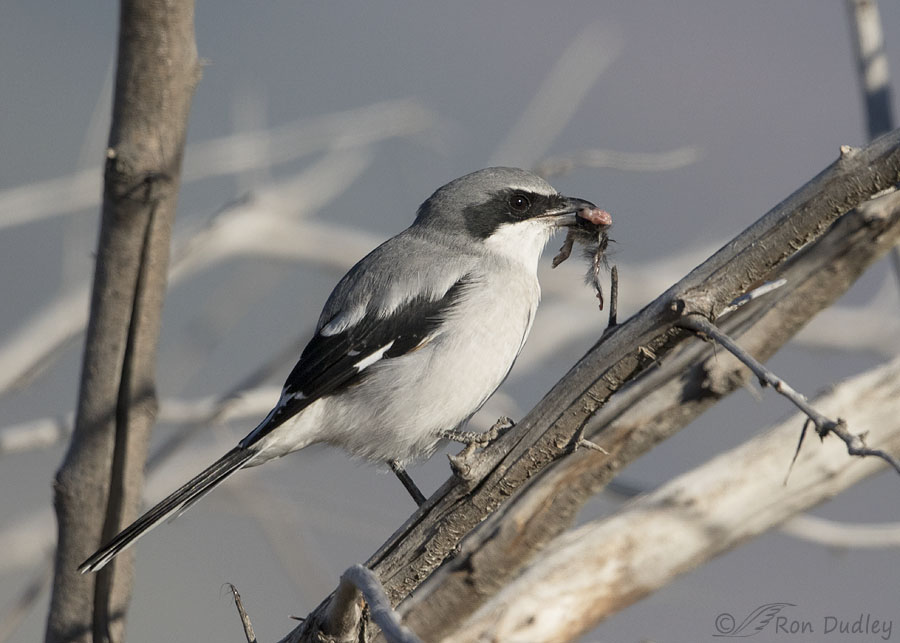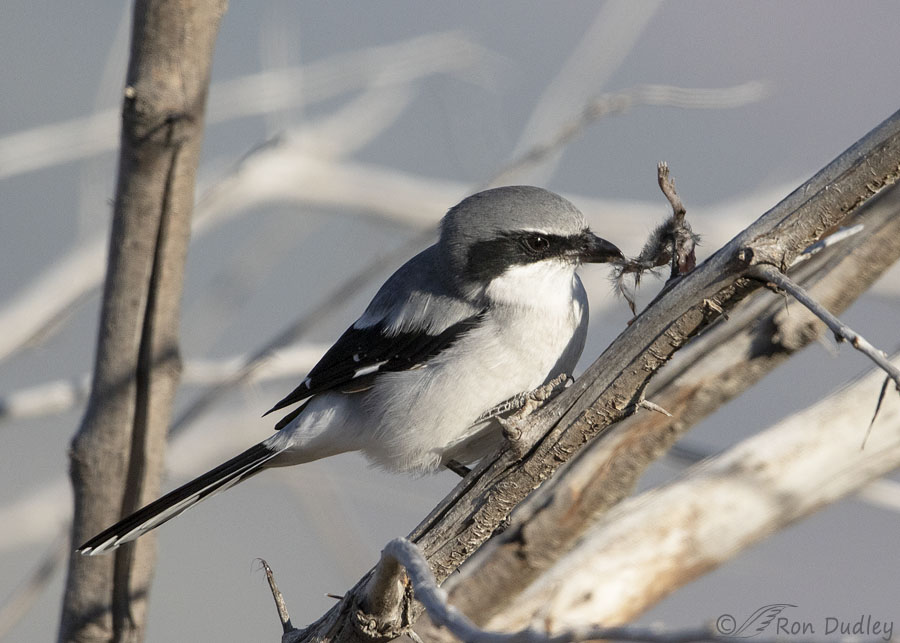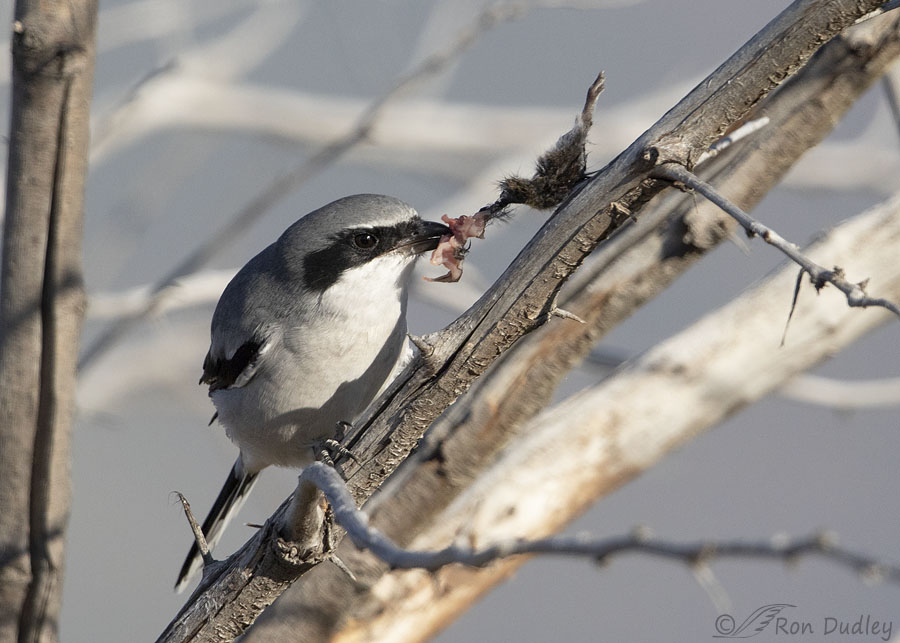A legendary but seldom photographed behavior.
Most of my readers know that Loggerhead Shrikes (and their close relatives Northern Shrikes) are often called “wannabe raptors” and for good reason. Loggerhead’s are strict carnivores, feeding on Arthropods, amphibians, small to medium-sized reptiles, small mammals and birds. During winter vertebrate prey, especially small mammals and birds, may constitute up to 76% of their diet.
But shrikes lack one of the primary tools of raptors – talons. Shrikes have perching feet like other songbirds so their legs and feet are too weak to hold onto prey and provide enough leverage to pull off chunks of flesh with their strong, hooked bills. Impaling their prey solves that problem.
Shrikes tend to be highly secretive about impaling their prey, after all they don’t want competitors to steal it, so it’s a behavior often performed in dense thickets where it’s hidden from the prying eyes of human observers. Over the years I’ve been lucky enough to photograph impaling behavior in shrikes several times when they skewered grasshoppers, dragonflies and voles.
The three photos below document one of those times.

1/5000, f/6.3, ISO 800, Canon 7D Mark II, Canon EF 500mm f/4L IS II USM + EF 1.4 III Extender, not baited, set up or called in
When I first got my lens on this shrike on Antelope Island ‘he’ had what I’d call a ‘hind quarter’ of a vole in his bill. This is the only photo in today’s post that I’ve posted before. I’m repeating it because it’s the best photo I have to clearly show the thorn that the shrike is about to impale the piece of vole on. There’s another thorn beneath his tail.
He actually impaled the vole chunk on the thorn twice before he tore a piece off and swallowed it. It was as if he was practicing the technique before enjoying his reward.

1/5000, f/6.3, ISO 800, Canon 7D Mark II, Canon EF 500mm f/4L IS II USM + EF 1.4 III Extender, not baited, set up or called in
Here he appeared to be evaluating or admiring his handiwork before he lifted the chunk off of the thorn and skewered it again. One leg and foot of the vole can clearly be seen.

1/4000, f/6.3, ISO 800, Canon 7D Mark II, Canon EF 500mm f/4L IS II USM + EF 1.4 III Extender, not baited, set up or called in
Even though the piece of vole was firmly anchored it still wasn’t easy for him to rip off a piece but he eventually got it done. Watching this process made it clear to me why his small, weak feet wouldn’t be up to the task of anchoring his prey.
“Wannabe’ raptor indeed.
Ron
Note: Impaling behavior has another function for shrikes other than anchoring their food. Shrikes store food in what’s referred to as their “larder” so impaling it in secretive places is a way of keeping it safe and hidden from potential thieves.


Outstanding series Ron! Thanks for sharing!
Charlotte Norton
Ron,
A day late but … so cool. I have always loved seeing your pics of this behavior.
Stephen
Wonderful series.
Thanks, April.
Some days I wannabe a raptor too.
Perhaps I should take lessons from this feisty and industrious bird.
Thanks Ron. I DO love your behavioural series.
Thanks, EC. Behaviors rock, don’t they!
Such great photos! I’m impressed with the fact this guy can impale his prey piece on the thorn above without impaling himself on the thorn below. And like Lyle, I’m wondering where the rest of that vole is, somehow impaled elsewhere in a large chunk? Or piecemeal?
Chris, the rest of the vole could have been impaled on other thorns or, more likely I think, already in the shrike’s digestive system.
As I was scrolling and reading this morning, my primary thought was, “Don’t back up!” I kept picturing a tire spike situation with Mr. Shrike. I never tire of seeing such interesting behavioral or physiological adaptations and wonder about the evolutionary path between shrikes and plants with thorns.
No shrikes here, but I did spend some time with a Black Phoebe fairly close to me as I was putting the garbage cans out this morning.
I just read your post above and had the same thought, so GMTA — squared!
Marty, backing up and then sitting down would be even worse!
I’d miss not having shrikes but then we don’t have Black Phoebes.
You’re welcome to come visit any time you’d like!
You two just made this old fart look up the meaning of GMTA.
We have the Northern Shrike here which I have seen maybe twice. Certainly not impaling its prey. Fascinating documentation.
One wonders where the rest of the vole is.
Thanks, Lyle. I wondered the same thing but figured he already ate the rest of it.
Not only are the photos great, I learned something new about bird behavior — as I often do from your posts. Thanks for keeping things interesting.
Thanks, Bob. Making things interesting for my readers makes them interesting for me too.
So interesting and clever!
Thanks, Kathleen.
Out on the prairie it’s harder for shrikes to hide their larder. And with grasshoppers, there may be less competition. I have seen barbed wire with a grasshopper on several barbs in a row.
Nancy, on our Montana farm I’ve seen and photographed a shrike trying to impale a grasshopper on a fence barb out in the open.
I continue to learn so much from you!! Merci beaucoup!!
Jje vous en prie, Mary.
I just love these little masked bandits. They just have so much pluck!
I know I have not commented for a long time, Ron, but I read your blog every day. And usually learn something. Thanks! Cathryn
That’s good to know. Thank you, Cathryn.
Fascinating!
Thanks, Terri.
Cool series, Ron….. We have Shrikes (which kind I’m not sure) upon occasion and they sure clear out the feeders! Definitely a challenge to get their meal in edible size chunks but, apparently, worth it……..
We have Shrikes (which kind I’m not sure) upon occasion and they sure clear out the feeders! Definitely a challenge to get their meal in edible size chunks but, apparently, worth it……..
Judy, up there you may have either or both species. Occasionally I see Northern Shrikes down here.
Very cool, though obviously not so fun for their unfortunate prey. Ain’t that always the way …
Tends to be, Cathy.